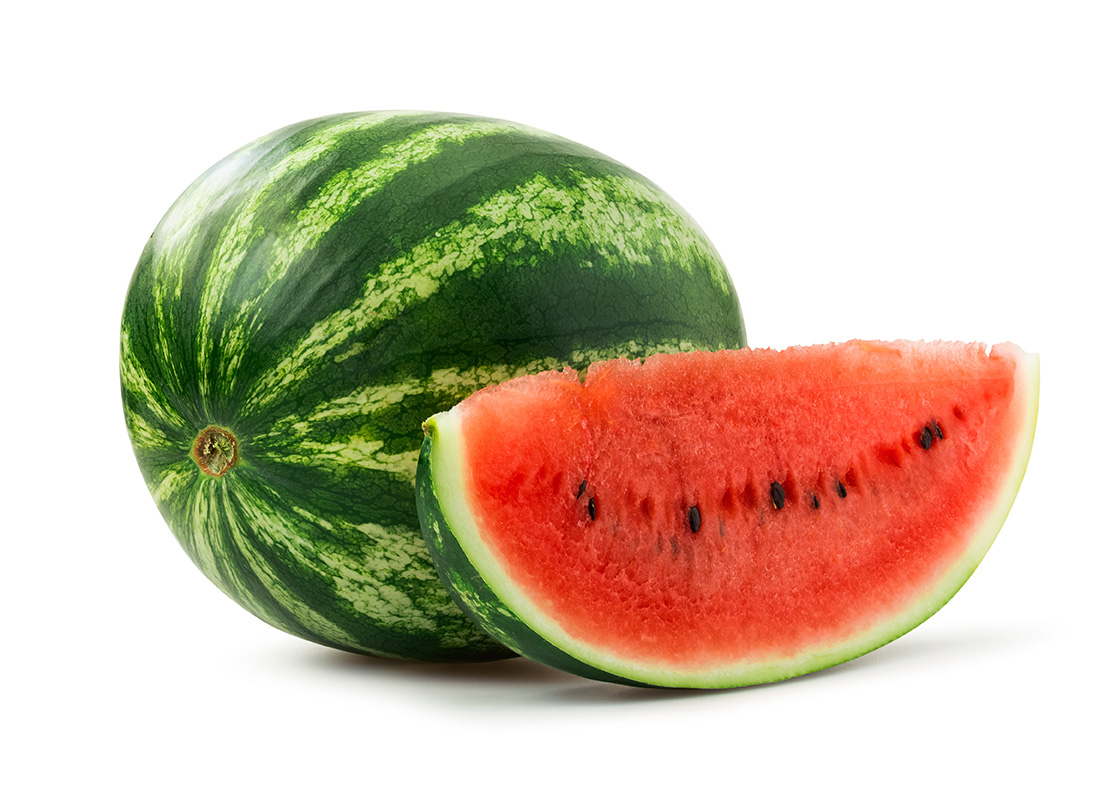Sweet is the flavor of the Spleen time of year, including this month of August. In July, I discussed the herb, jujube date, which is sweet but not the sweet flavor most of us think of as in sugar or candy. So what about a true sweet-sweet herb such as a fruit? (Yes, fruits can be used as medicine, as can all foods.) Watermelon becomes available this time of year and so is a perfect food to use as medicine now. Interestingly, all parts of watermelon may be used medicinally – fruit, seed, rind, and frost.
FRUIT
Let’s start with the watermelon fruit itself, the sweet-sweet so many people crave. Watermelon can be incredibly satisfying on hot summer days. Indeed, it has a cold energy and so cools the body down. The Chinese call it the “natural” White Tiger Decoction, which is an exceedingly cold formula used for high fevers. Watermelon fruit generates fluids with symptoms of strong thirst, dry heaves, irritability, fever, dark, scanty urination, jaundice, and hepatitis.
Because watermelon is so good at cooling the body down, eating watermelon, or drinking watermelon juice, at other times of the year is not a good idea, unless you live in an exceedingly hot climate. Neither is eating or drinking watermelon at any time of year if you feel cold or have signs of coldness (see avoid below).
If we eat according to a food’s natural season, watermelon ripens in late summer. This is the perfect time of year to enjoy watermelon as it cools you down when its most needed. Heat begins to accumulate in the body by the end of summer after months of heat building up inside. Cooling this heat is preferred now so it doesn’t become trapped when the weather cools, making it turn into internal latent heat that causes health problems.
Watermelon Fruit, Rind, Fresh Juice
Xi gua (Chinese)
Also named: Citrulli FructusCitrullus lanatus, C. vulgaris, formerly known as: Cucurbita sativus
Family: Cucurbitaceae
Energy and flavors: Cold, sweet
Organs and channels affected: Heart, Stomach, Bladder
Chemical constituents: Citrulline, betaine, arginine, lycopene, phytofluene, Vitamin C, bromine, fructose, dextrose, sucrose, malic acid, phosphoric acid
Properties and actions: Diuretic, refrigerant; clears Summer Heat, drains Dampness, clears Damp-Heat
Caution: Digestive weaknessAvoid if you have feelings of coldness; copious, clear urination; white, copious or runny discharges; pale, frigid appearance; cold limbs; lassitude; fatigue; edema; loose stools or diarrhea; night-time urination; infertility; impotence; frigidity; or undigested food in the stools.
Dosage and preparation: Fresh juice, 1 cup. Decoction, 15-30g.
SEEDS
Growing up in the Midwest, we always salted our watermelon, which makes it taste sweeter. Yet, salt causes water retention and watermelon is high in fluid. So how do we enjoy salted watermelon and not retain water? By using the seeds!
Watermelon seeds are actually diuretic, helping flush excess fluids from the body. You can eat a few seeds when you have your watermelon, but you can also use them separately as medicine. They drain fluid retention, treating edema and urinary inflammation.
Watermelon Seed Citrullus lanatus, formerly known as: C. vulgaris
Also named: Citrulli Semen
Family: Cucurbitaceae
Energy and flavors: Neutral, bland
Organs and channels affected: Bladder, Stomach, Heart, Small Intestine
Chemical constituents: Not specifically identified; the fruit contains amino acid, cit- rulline, aminoacetic acid, lycopene, carotene, Vitamin C, bromine, fructose, dextrose, sucrose, malic acid, phosphoric acid
Properties and actions: Diuretic, refrigerant, sialagogue; drains Dampness Contraindications: None noted
Dosage and preparation: Decoction, 6-15g. Tincture (1:3 @65-70% ABV), 10-60 drops TID.
RIND
Watermelon rind is also used as medicine. It is not as cooling and is more diuretic than the fruit or seeds. Medicinally, it is used for jaundice with dark urine and edema from Summer Heat, a condition of heat accumulation in the body during the heat of summer. Its signs and symptoms include: headache, scanty-dark urination, dry lips, thirst, and an aversion to heat. The pulse is rapid while the tongue is red on the sides and tip.
FROST
Watermelon frost is not known in the West but is widely found in patent packaged form as a Chinese medicine. It is sold as a cheap and effective topical treatment for red mouth sores, severe sore throat, canker sores, and ulcers. It has a very cold energy.
To make your own “Watermelon Frost,” wash a 6- to 7-pound watermelon and dry. Cut off the top near the pedicle and scoop out the watermelon. Fill the watermelon shell with 2.2 lbs. of Glauber’s salt. Put the top back on and set in a cool, well-ventilated place (if it’s too damp, the melon will rot). In a couple of days the “frost” grows on the outside of the watermelon. Scrape off and apply topically.

